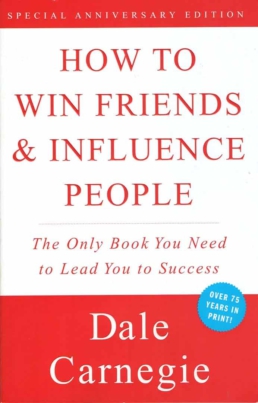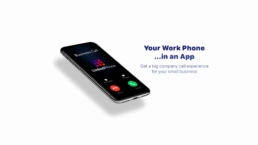How to Win Friends & Influence People [Book Outline & Summary]
What are the central ideas of How to Win Friends & Influence People?
Dale Carnegie’s “How to Win Friends & Influence People” is a textbook for human relations that anyone can benefit from. The book’s four core principles include the importance of honest and sincere appreciation, the power of empathetic listening, how to persuade others while showing them respect, and positive leadership without provoking resentment.
If you have ever tried to get a child to take medicine, you likely understand the old adage “a spoonful of sugar helps the medicine go down.” The idea behind this can be applied to much more than just medicine. It is certainly common in interpersonal relationships that sweetness is more likely to win you friends and get positive results than a bitter approach.
In How to Win Friends and Influence People, Dale Carnegie guides us on how to bring that sweetness to the table in our interactions with other people, using various techniques designed to build true connections and encourage people in a positive manner.
Since its first publication in 1936, Carnegie’s principles have guided countless readers, and they remain profoundly relevant today. While there are many self-help books on the topic of influencing people and becoming more likable, what is unique about How to Win Friends and Influence People is its emphasis on positivity, empathetic listening, respectful persuasion, and kind leadership. Carnegie avoids manipulative tactics, focusing instead on honesty, respect and building genuine connections.
LinkedPhone serves the small business community with local & toll-free business numbers that work with your cell phone, desk phone, & laptop. Add a 2nd phone number to your cell phone with our mobile app. Talk & text with clients on the go. Add team members too. Finally break free from the desk phone. At LinkedPhone, freedom rings! 🔔📱💻☎️
The Core Message of Carnegie's Classic
While How to Win Friends and Influence People can certainly teach you how to be more likable and influential, this book is about more than making friends and influencing people. The timeless wisdom contained in Carnegie’s influential self-help book serves as a guide to interpersonal communication and fostering meaningful personal and professional relationships.
In essence, Carnegie’s book revolves around improving communication skills, enhancing interpersonal relationships, building trust, and influencing others positively. The underlying theme is that to influence others, you need to be able to communicate effectively, demonstrate empathy, and show genuine interest and appreciation for others.
A Textbook for Everyone
Carnegie explains how a University of Chicago survey which asked Americans what they were interested in studying revealed that, following health, their second most common interest was people: how to make people understand you and how to get along with people, how to make friends, how to influence people to your way of thinking, and so on. When a course was designed for this purpose, no appropriate textbook could be found.
Carnegie initially wrote How to Win Friends and Influence People to fill this academic role, but the book is relevant for anyone looking to improve their interpersonal and communication skills. While the lessons it contains can be applied to any area of your life, entrepreneurs, small business owners, freelancers, salespeople, and anyone in a leadership role, such as supervisors managing remote teams, can greatly benefit from the principles in this book.
An Expert in the Field of Human Relations
Dale Carnegie was a renowned writer and lecturer known for his courses in self-improvement, corporate training, public speaking, and interpersonal skills. An expert in the field of human relations, Carnegie has had a significant influence on the personal development industry. His credibility as a thought leader makes How to Win Friends and Influence People a respected reference in its field.
Business Growth Toolkit
Get the latest thought leadership insights on growing your business plus occasional LinkedPhone updates. We respect your inbox!
The Key Principles in "How to Win Friends and Influence People"
Carnegie begins by providing tips on how to get the most out of the book. One of our favorites is his recommendation that you make a game out of your learning, and offer a friend a dime or dollar every time they catch you violating a principle in the book. He also recommends that you review the book regularly, and keep track of your progress.
Carnegie’s book is then divided into four sections, each devoted to a different key principle, addressing a set of skills for mastering human relations. Let’s take a closer look at these four main sections:

Part One: Fundamental Techniques in Handling People
Encouraging Positivity through Appreciation
Part One focuses on the importance of honest and sincere appreciation. Carnegie advises against criticism, which often only makes influencing people more difficult. Like kicking over a beehive to gather honey, criticism leads to resentment and defensiveness. Carnegie advocates instead for understanding and appreciation to foster positivity and gain cooperation.
Carnegie reveals “the big secret” of dealing with people and getting people to like you: praise. Honest and sincere appreciation, he argues, is the “legal tender that all souls enjoy,” and gets results where criticism and ridicule fail.
The final concept of Part One is that people are most motivated by what they want. When you go fishing, Carnegie argues, you don’t use strawberries and cream for bait just because it is your favorite food, you use what the fish eats. Carnegie maintains that positively influencing people requires the same approach. If you can understand and acknowledge a person’s desires, you are much more likely to get them to do what you want.
-
- "Don't criticize, condemn, or complain."
- "Give honest and sincere appreciation."
- “Arouse in the other person an eager want.”

Part Two: Six Ways to Make People Like You
Harnessing the Power of Empathetic Listening
Part Two is all about the power of empathetic listening and making the other person feel important. Carnegie insists on the value of becoming genuinely interested in others and being a good listener as the first step to making someone like you. Carnegie offers specific techniques, focusing for example on the power of a simple smile to make a good first impression that conveys warmth, openness and goodwill.
An entire chapter is dedicated to the importance of remembering people’s names, with Carnegie claiming that “if you don’t do this, you are headed for trouble,” because a person’s own name is the sweetest sound they can hear.
Carnegie next offers advice on being a good conversationalist, with the acknowledgement that this requires being an attentive listener more than it requires being good at talking. He advises that to be interesting, you must be interested. Encouraging others to talk about themselves and asking questions that they will enjoy answering is a form of flattery that few people can resist, and leaves people with the impression that you are a good conversationalist even if you haven’t said a lot yourself.
-
- “Become genuinely interested in other people.”
- “Smile.”
- “Remember that a person’s name is to that person the sweetest and most important sound in any language.”
- "Be a good listener. Encourage others to talk about themselves."
- “Talk in terms of the other person’s interests.”
- “Make the other person feel important – and do it sincerely.”
To read more about connecting with current and potential customers, take a look at our articles on customer service examples, customer retention, and how to get more customers for your small business.
Enjoying this in-depth book review?
Check out the full list of business books we’ve rated and summarized for you here: 44 Best Business Books for Entrepreneurs, Startups & Small Business

Part 3: How to Win People to Your Way of Thinking
Encouraging Positivity through Appreciation
The main principle of Part Three revolves around persuading others while showing respect for their opinions. Carnegie suggests that to win people to your way of thinking, you should avoid arguments, because arguments yield no winners. He further advocates for showing respect for others’ opinions by learning more about their ideas, and always admitting when you are wrong.
Carnegie emphasizes the importance of treating people with kindness and encouragement rather than trying to convince them or win them over by force. These principles promote a respectful, open-minded approach to discussions, which in turn facilitates persuasion and influence.
-
- “The only way to get the best of an argument is to avoid it.”
- "Show respect for the other person's opinions. Never say, 'You're wrong.'"
- “If you are wrong, admit it quickly and emphatically.”
- “Begin in a friendly way.”
- “Get the other person saying ‘yes, yes’ immediately.”
- “Let the other person do a great deal of talking.”
- “Let the other person feel that the idea is his or hers.”
- “Try honestly to see things from the other person’s point of view.”
- “Be sympathetic with the other person’s ideas and desires.”
- “Appeal to the nobler motives.”
- “Dramatize your ideas.”
- “Throw down a challenge.”
For more on persuasion and handling relationships with customers, check out our articles on how to respond to a customer complaint or how to handle difficult customers.
Part 4: Be a Leader - How to Change People Without Giving Offense or Arousing Resentment
Leading with Kindness and Understanding
In the last section, Carnegie focuses on leadership and how to change people without invoking resentment. Carnegie posits that leaders should begin with praise and honest appreciation when attempting to change someone’s behavior, and that it’s always better to subtly guide someone to their mistakes rather than outright condemning them.
Carnegie emphasizes that asking questions can allow the other person to solve their own problems, offering them the satisfaction of self-discovery and leaving their self-esteem intact. And if you can make the fault seem easy to correct, people are more likely to make the effort to change.
In the chapter “Give a Dog a Good Name,” Carnegie explains that everyone has a desire to feel important. By giving people a fine reputation to live up to, such as an important title or a public acknowledgment, leaders can encourage them to improve to live up to the reputation.
Carnegie goes on to explain that one must talk about one’s own mistakes before correcting the other person. This section concludes with the idea that no one likes to take orders, and that asking questions rather than giving a direct order can make an order more palatable.
-
- “Begin with praise and honest appreciation.”
- “Call atention to people’s mistakes indirectly.”
- "Talk about your own mistakes before criticizing the other person."
- “Ask questions instead of giving direct orders.”
- “Let the other person save face.”
- “Praise the slightest improvement and praise every improvement. Be hearty in your approbation and lavish in your praise.”
- “Give the other person a fine reputation to live up to.”
- “Use encouragement. Make the fault seem easy to correct.”
- "Make the other person happy about doing the thing you suggest."
Strong communication with customers and employees is one of the key characteristics of a successful entrepreneur. Click to read more about skills you need to succeed as an entrepreneur.
Advice that Stands the Test of Time
First published in 1936, this book remains one of the best-selling books of all time, having sold millions of copies worldwide. “How to Win Friends and Influence People” is a treasure trove of insights for anyone who wants to improve their interpersonal skills. It offers simple, practical advice that stands the test of time. The lessons it provides about positivity, empathy, respect, and kindness are invaluable in the workplace as well as in personal relationships and everyday interactions.
Carnegie’s book serves as a guide that can help entrepreneurs, small business owners, freelancers, and indeed all people, to build more meaningful relationships, influence others positively, and ultimately become more successful in their personal and professional lives. This is a classic that is still widely read and referred to today due to its timeless wisdom and practical advice.
You can find out more about the book and read other reviews or purchase your own copy on Amazon, or listen to the audiobook on Audible.
Did you enjoy this book review? Make sure to check out the full list of 44 Best Business Books for Entrepreneurs, Startups & Small Business.
And don’t forget to browse our collections of business podcasts and online forums for entrepreneurs for more small business resources.
LinkedPhone provides essential communication tools for entrepreneurs and small business owners to help manage busy operations. Find out more about the many professional calling features provided by our virtual phone system, or sign up for a 7-day free trial of LinkedPhone with a free business phone number today!
Small Business Resources
A special high five to Faith Dickens for her outstanding research and contributions to this article. We love working with and supporting like-minded entrepreneurs. Thank you Faith! ❤️
Get In Touch
We would love to hear from you.
Please contact us at any time with questions or feedback.



























